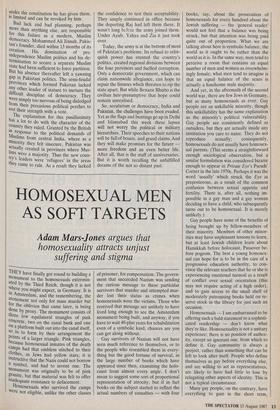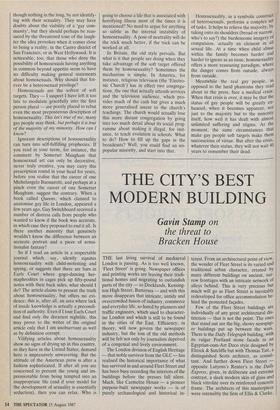HOMOSEXUAL MEN AS SOFT TARGETS
Adam Mars Jones argues that
homosexuality attracts unjust suffering and stigma
THEY have finally got round to building a monument to the homosexuals extermin- ated by the Third Reich, though it is not Where you might expect, in Germany. It is in Amsterdam, and the remembering, the atonement not only for mass murder but for the oblivion that came later, is being done by proxy. The monument consists of three low equilateral triangles of pink concrete, two on the canal bank and one on a platform built out into the canal itself, so as to form by their arrangement the points of a larger triangle. Pink triangles, because homosexual inmates of the death camps had that emblem stitched to their clothes, as Jews had yellow stars; it is instructive that the Nazis could not borrow a symbol, and had to invent one. The monument was originally to be of pink granite, but that material was felt to offer inadequate resistance to defacement.
Homosexuals who survived the camps were not eligible, unlike the other classes of prisoner, for compensation. The govern- ment that succeeded Nazism was sending the curious message to these particular survivors that murder and attempted mur- der lost their status as crimes when homosexuals were the victims. Those who received that message are unlikely to have lived long enough to see the Amsterdam monument being built, and anyway, if you have to wait 40-plus years for rehabilitation even of a symbolic kind, chances are you can get along without.
Gay survivors of Nazism will not have seen much reference to themselves, or to the people who resembled them in every- thing but the good fortune of survival, in the large number of books which have appeared since then, examining the holo- caust from almost every angle. I don't mean to suggest some sort of proportional representation of atrocity, but if in fact books on the subject started to reflect the actual numbers of casualties — with four books, say, about the prosecution of homosexuals for every hundred about the Jewish suffering — the 'general reader' would not feel that a balance was being struck, but that attention was being paid quite out of proportion. What we are talking about here is symbolic balance, the world as it ought to be rather than the world as it is. In the same way, men tend to perceive a room that contains an equal number of men and women as overwhelm- ingly female; what men tend to imagine is that an equal balance of the sexes is actually a handsome male majority. And yet, in the aftermath of the second world war, there are few Jews in Germany, but as many homosexuals as ever. Gay people are an unkillable minority, though this unkillability has the same explanation as the minority's political vulnerability. Gay people are consistently defined as outsiders, but they are actually inside any institution you care to name. They do not
reproduce sexually; consequently, homosexuals do not usually have homosex- ual parents. (This seems a straightforward enough sociological observation, but a similar formulation was considered bizarre enough to appear in Private Eye's Pseuds' Corner in the late 1970s. Perhaps it was the word 'usually' which struck the Eye as preposterous, as a result of the common confusion between sexual appetite and fertility. There is, after all, nothing im- possible in a gay man and a gay woman deciding to have a child, who subsequently turns out to be homosexual. It is merely unlikely.)
Gay people have none of the benefits of being brought up by fellow-members of their minority. Members of other minor- ities may have unpleasant lessons to learn, but at least Jewish children learn about Hanukkah before holocaust, Passover be- fore pogrom. The best a young homosex- ual can hope for is to be in the care of a progressive education authority, to con- vince the relevant teachers that he or she is experiencing emotional turmoil as a result of conflict over sexual orientation (this may not require acting of a high order), and to gain access to the small shelf of moderately patronising books held on re- serve stock in the library for just such an occasion.
Homosexuals — I am embarrassed to be offering such a bald statement to a sophisti- cated readership — don't know what they're like. Homosexuality is not a unitary experience; there is no position of author- ity, except an ignorant one, from which to define it. Gay community is always a project, rather than something that can be left to look after itself. People who define themselves as gay before everything else, and are willing to act as representatives, are likely to have had little to lose by relegating other aspects of identity. This is not a typical circumstance.
Many gay people, on the contrary, have everything to gain in the short term,
though nothing in the long, by not identify- ing with their sexuality. They may have doubts about the viability of a 'gay com- munity', but they should perhaps be reas- sured by the threatened tone of the laugh- ter the idea provokes when it comes close to being a reality, in the Castro district of San Francisco, or in West Hollywood. It is noticeable, too, that those who deny the possibility of homosexuals having anything in common beyond appetite seem to have no difficulty making general statements about homosexuals. Why should that for- ever be a heterosexual privilege?
Homosexuals are the softest of soft targets. They — I suspect I have left it too late to modulate gracefully into the first person plural — are poorly placed to rebut even the most preposterous description of homosexuality. This isn't true of me, many gay people may think, but perhaps it is true of the majority of my minority. How can I know?
Ignorant descriptions of homosexuality can turn into self-fulfilling prophecies. If you read in your teens, for instance, the comment by Somerset Maugham that homosexual art can only be decorative, never truly creative, you may carry this prescription round in your head for years, before you realise that the career of one Michelangelo Buonarotti, and perhaps at a pinch even the career of one Somerset Maugham, suggest the contrary. When a book called Queens, which claimed to anatomise gay life in London, appeared a few years ago, Gay Switchboard received a number of distress calls from people who wanted to know if the book was accurate, in which case they proposed to end it all. Is there another minority that genuinely wouldn't know the difference between an accurate portrait and a piece of sensa- tionalist fantasy?
So if I read an article in a respectable journal which, say, silently equates homosexuality with child-molesting and spying, or suggests that there are bars in Earls Court where gogo-dancing her- maphrodites in cages pick up fifty-pound notes with their back sides, what should I do? The article claims to present the truth about homosexuality, but offers no evi- dence; this is, after all, an area where lack of inside knowledge is actually a precondi- tion of authority. Even if I tour Earls Court and find only the dreariest nightlife, this may prove to the writer of the original article only that I am unobservant as well as by definition corrupt.
Vilifying articles about homosexuality show no signs of drying up in this country, as they have in the United States; demand here is impressively unwavering. But the attitude of the American press is after a fashion sophisticated. If after all you are concerned to prevent the young and im- pressionable from being tempted into an inappropriate life (and if your model for the development of sexuality is essentially seduction), then you can relax. Who is going to choose a life that is associated with horrifying illness most of the times it iS mentioned? No need to argue for anything so subtle as the internal instability of homosexuality. A pose of neutrality will do the trick much better, if the trick can be worked at all.
In Britain, the old style prevails. But what is it that people are doing when they take advantage of the soft target offered them by homosexuality? Sometimes the mechanism is simple. In America, for instance, religious television (the 'Electro- nic Church') has in effect two congrega- tions, the one that actually attends services and the television audience, which pro- vides much of the cash but gives a much more generalised assent to the church's teachings. The church would actually lose this more distant congregation by going into too much detail about its social prog- ramme about making it illegal, for inst- ance, to teach evolution in schools. What to do? How to fill up the gaps in the broadcasts? Well, you could find an un- popular minority, and start into that.
Homosexuality, as a symbolic construct of heterosexuals, performs a complex set of tasks. It helps to relieve the majority, by taking onto its shoulders (broad or narrow, who's to say?) the burdensome imagery of compulsion, actually an element in all sexual life. At a time when child abuse within the family becomes harder and harder to ignore as an issue, homosexuality offers a more reassuring paradigm, where the danger comes from outside, always from outside.
Meanwhile the real gay people, as opposed to the lurid phantoms they read about in the press, face a medical crisis. When that crisis is over, it may be that the status of gay people will be greatly en- hanced, when it becomes apparent, not just to the majority but to the minority itself, how well it has dealt with almost unlimited suffering and stigma. At the moment, the same circumstances that make gay people soft targets make them unconscious of virtue. But after the crisis, whatever their status, they will not wait 40 years to remember their dead.



















































 Previous page
Previous page